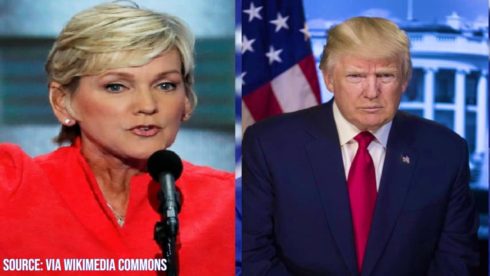Energy Secretary Jennifer Granholm has vehemently criticized former President Donald Trump’s proposal to eliminate subsidies for electric vehicles (EVs). Jennifer Granholm argued that cutting the $7,500 tax credit would inadvertently benefit China by allowing the nation to dominate the burgeoning EV market. “You eliminate these credits, and what do you do? You end up ceding the territory to other countries, particularly China,” Jennifer Granholm stated, emphasizing the strategic implications of such policy changes.
Jennifer Granholm further asserted that removing these incentives would signify a retreat from a robust industrial strategy. “If we want to stand by and watch offshoring again and cede this territory, then we don’t have an industrial strategy,” she explained. Instead, she advocated for maintaining and enhancing these subsidies to ensure the United States remains competitive in the global EV industry. Jennifer Granholm highlighted that sustained incentives are essential for fostering innovation and securing America’s leadership in clean technology.
Economic Ramifications of Eliminating EV Tax Credits
The proposed elimination of the $7,500 EV tax credit is expected to have significant economic consequences. By reducing these incentives, the administration fears a decline in consumer adoption of electric vehicles, which could slow down the growth of the EV market in the United States. This downturn may lead to decreased investments in EV manufacturing and related industries, potentially resulting in job losses and diminished economic growth within the green technology sector.
Moreover, Jennifer Granholm warned that such policy shifts could undermine the progress made in creating a sustainable and resilient automotive industry. The removal of subsidies might deter both domestic and international investors, weakening the overall economic landscape. Maintaining these credits is seen as pivotal for stimulating demand, encouraging innovation, and ensuring that the U.S. remains a competitive player in the rapidly evolving global EV market.
Strategic Competition with China in the Electric Vehicle Sector
Jennifer Granholm emphasized that maintaining EV subsidies is crucial for countering China’s aggressive advancements in the electric vehicle sector. China has been strategically investing in EV infrastructure and manufacturing capabilities, positioning itself as a global leader in clean energy technology. By sustaining subsidies, the United States can bolster its own EV industry, fostering innovation and ensuring that American companies remain at the forefront of technological advancements.
The Energy Secretary highlighted that without these incentives, the U.S. risks falling behind in the race for dominance in the EV market. Jennifer Granholm pointed out that China’s substantial investments are creating a competitive edge that could overshadow American efforts if the U.S. does not continue to support its EV industry through financial incentives and policy support. Strengthening domestic EV production is essential for national security and economic stability in the face of global competition.
Impact on Fossil Fuel Industries and Environmental Goals
Trump’s proposed cuts to EV subsidies are seen as a boon for fossil fuel companies, who stand to gain from decreased competition in the automotive sector. By making electric vehicles less financially attractive to consumers, the administration’s plan could lead to increased reliance on traditional fossil fuel-powered vehicles, hindering the transition to cleaner energy sources. Jennifer Granholm criticized this approach, arguing that it represents a step backward in the fight against climate change.
Jennifer Granholm stressed that reducing EV incentives would directly contradict the Biden administration’s environmental objectives. The push for electric vehicles is a cornerstone of efforts to reduce greenhouse gas emissions and combat global warming. By scaling back support for EVs, the administration risks derailing progress toward achieving significant environmental milestones and undermining nationwide sustainability initiatives.
Broader Implications for U.S. Industrial Strategy and Innovation
The debate over EV subsidies extends beyond immediate economic and environmental concerns, touching on the broader scope of the United States’ industrial strategy. Jennifer Granholm asserted that maintaining these incentives is vital for fostering a culture of innovation and supporting the growth of high-tech industries. The EV sector, with its reliance on advanced technologies and materials, is a critical component of America’s future industrial landscape.
By ensuring continued support for electric vehicle development, the Biden administration aims to create a robust ecosystem that encourages research and development, attracts top talent, and stimulates technological breakthroughs. This strategic focus on innovation is intended to drive long-term economic prosperity and secure the United States’ position as a global leader in next-generation industries. Jennifer Granholm’s defense of EV subsidies underscores the administration’s commitment to building a resilient and forward-thinking industrial framework.
Public and Political Reactions to Subsidy Cuts Proposal
The proposal to cut EV subsidies has sparked significant debate among policymakers, industry leaders, and the general public. Supporters of Jennifer Granholm argue that the tax credits are essential for accelerating the adoption of electric vehicles and achieving environmental targets. They contend that eliminating these incentives would not only harm the economy but also set back national efforts to address climate change.
Conversely, proponents of the subsidy cuts, including Trump’s allies, argue that reducing financial incentives can lead to a more balanced automotive market and decrease government spending. However, Jennifer Granholm and her supporters maintain that the long-term benefits of sustaining EV subsidies far outweigh the short-term fiscal savings. The ongoing discourse reflects the broader ideological divide on the role of government intervention in promoting sustainable technologies and shaping the future of the automotive industry.














